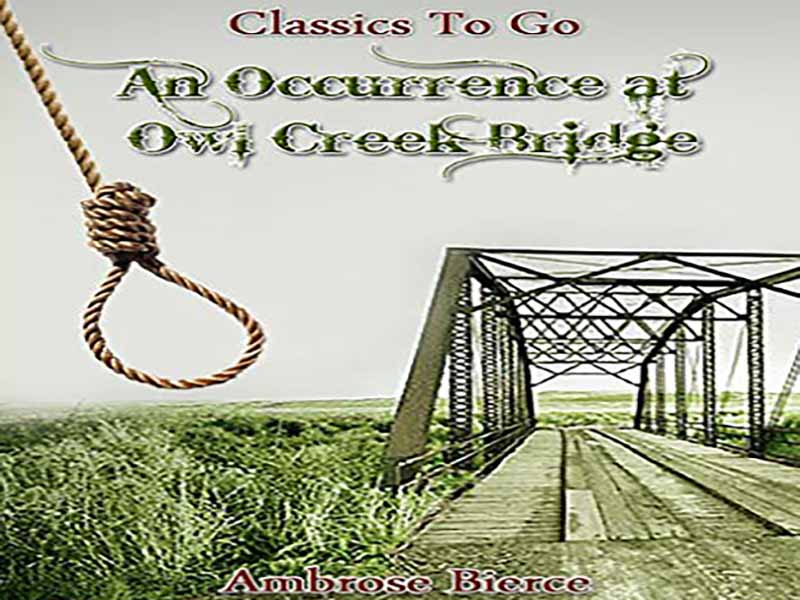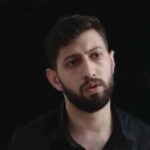داستان حادثهای در پل اول کریک اثر امبروس بیرس
مردی روی پل آلابامای شمالی ایستاده، به آبی که بیست متر پایینتر به تندی جریان داشت، مینگریست. دستهای او را از پشت با ریسمانی بسته بودند و حلقه سست طنابی گردن او را در میان گرفته بود، که از صلیب چوبی بزرگی در بالای سرش آویزان بود و دنباله آن تا زانوان مرد امتداد داشت. چند تخته لق از تختههایی که زیر ریلهای راه آهن میگذارند، جا پایی محکوم شده بود و اعدام کنندگانش دو سرباز ویژه ارتش فدرال و فرماندهی که احتمالا قبلا معاون کلانتر بوده باشد، بود. به فاصله کمی از آنها بر روی همان سکوی موقتی، افسری مسلح، که درجه سروانی داشت، در لباس نظامیش دیده میشد.
در انتهای هر دو طرف پل یک نگهبان با تفنگ در حالت آماده باش، به حالتی که تنفگ بصورت عمودی در مقابل شانه چپ و چخماق آن بر ساعد و ساعد بر روی سینه به حالتی رسمی و غیر طبیعی و باهیبت ایستاده بودند. ظاهراً وظیفه این دو مرد این نبود که بدانند در وسط پل چه میگذرد. بلکه آنها صرفاً دو انتهای تخته پارههایی را که تبدیل به جا پا شده بودند را مسدود کرده بودند.
در آن سوی ساحل رودخانه کسی دیده نمیشد و راه آهن صد یارد مستقیم در جنگل پیش میرفت، بعد کج شده، از نظر ناپدید میشد. کمی دورتر در مسیر راه آهن، پاسگاهی قرار داشت. آن ساحل دیگر رود محوطه اجرا بود و در شیب ملایم آن، با چند تنه درخت مانعی ایجاد کرده بودند که در آنها سوراخهایی برای لوله تفنگ تعبیه شده و لوله توپی که کل پل را زیر نظر داشت و تنها لوله آن بیرون زده بود. بین پل و این بخش، تماشاگران ایستاده بودند.
عدهای سرباز پیاده در صف به حالت راحتباش نوک تفنگها بر زمین، لولههایشان متمایل به عقب در مقابل شانه راست و دستها صلیبوار بر قنداق قرار داشتند و ستوانی در طرف راست صف ایستاده بود که نوک شمشیرش بر زمین و دست چپ او بر روی دست راستش، به استثنای گروه چهار نفره وسط پل، هیچکدام کوچکترین حرکتی نمیکردند. دسته، بیحرکت، چون سنگ روبهروی پل ایستاده، به صحنه اعدام چشم دوخته بودند. نگهبانان رو به دو ساحل رود مانند مجسمههایی بودند که برای زینت پل قرار داده شدهاند. ستوان دست به سینه، ساکت ایستاده، دستور کاری زیر دستانش را نگاه میکرد، ولی کاری انجام نمیداد.
مرگ رویدادی شکوهمند است که وقتی با اطلاع قبلی برای انسان رخ میدهد باید با ادای احترامات رسمی استقبال شود، حتی به وسیله آنهایی که با آن خیلی آشنا هستند. در آداب نظامی سکوت و بیحرکت بودن نشانههای احترام هستند.
مردی که به دار کشیده میشد، ظاهراً در حدود سیت و پنج سال داشت. اگر بر مبنای ظاهرش شغل او را بتوان تشخیص داد، به نظرش میرسید که از اهالی شهر است، ولی او یک کشاورز بود. سیمای خوش ترکیبی داشت، بینی مستقیم، آرواره محکم، پیشانی پهن و موهای بلند و سیاه که صاف، به طرف عقب شانه شده بود
و از پشت گوشهایش روی یقه خوش دوختش میافتاد. سبیل و ریش بزی داشت، ولی بر گونههایش مویی نبود. چشمانش درشت و سیاه مایل به خاکستری بودند.
با حالتی محبت آمیز، که انسان هیچ چنین حالتی را از کسی که سرش بالای دار است، انتظار ندارد. مشخص بود که آدمکشی عادی نیست. قوانین حکومت نظامی، اشخاص مختلف بسیاری را به مرگ محکوم میکند و در آن، افراد محترم استثناء نیستند.
عملیات که پایان یافت، دو سرباز ویژه کنار رفتند و هریک تخته زیر پای خود را کشیده، دور کردند. گروهبان به طرف سروان برگشت، سلام نظامی داد و به سرعت پشت افسر قرار گرفت، که او هم به نوبه خود چند قدم از او دور شد. با این کارها، مرد محکوم و گروهبان در دو سوی همان تخته پاره باقی ماندند که مانند پلی بر روی سه تخته از تخته پارههای پل قرار داشت. انتهایی که محکوم روی آن ایستاده بود، تقریباً ولی نه کاملاً، به تخته چهارم میرسید. این تختهپاره وزن سروان را نگاه میداشت، اکنون که سروان جای او را گرفته بود با اشاره اولی، دومی کنار میرفت و تخته کج میشد و مرد از میان گره به پایین میافتاد. این دستگاه به نظر او ساده و مؤثر میآمد. صورت و چشمان او را نبسته بودند.
محکوم لحظهای به جا پای نااستوار خود نگاه کرد، بعد نگاهش را به آب غران رود که زیر پایش دیوانه وار جریان داشت، برگرداند. تکهای چوب که بر روی آب میرقصید، توجه او را جلب کرد و چشمانش تا ناپدید شدنش آنرا دنبال کردند. حرکت آن چه کند به نظر میرسید، آب چه کند جریان داشت. چشمانش را بست تا در این لحظه آخر فکرش را متوجه زن و فرزندانش سازد. آب که زیر نور خورشید صبحگاهی رنگی طلایی داشت، توده مه برخاسته از سرازیری رود، قلعه سربازان، تکه چوب شناور، همه او را میآشفت و حال اضطراب تازهای او را فرا گرفت.
صدایی او را از فکر عزیزانش منصرف ساخت. صدایی که نه میتوانست آن را بفهمد و نه نادیدهاش بگیرد، صدایی دلهره انگیز، مانند طنین ضربه چکش آهنگر بر سندان. متحیر ماند که این صدا از کجاست و آیا نزدیک است یا دور –هر دو به نظر میرسید. تکرار آن منظم بود و به همان تداوم و کندی ناقوس مرگ. با بیصبری و نگرانی انتظار هر
ضربه دیگر را میکشید، علت این بیصبری را نمیدانست، فاصله دو ضربه، لحظه به لحظه بیشتر میشد، این سکوت او را دیوانه میکرد. با طولانیتر شدن فاصلهها صدای آن قویتر و دلخراشتر میشد و گوش او را آزار میداد مانند دردی که از برخورد چاقو به تن احساس میشود، از ترس میخواست فریاد بزند.
تنها صدایی که میشنید صدای تیکتاک ساعتش بود. چشمانش را باز کرد و دوباره جریان آب زیر پاهایش را دید، فکر کرد ” اگر میتوانستم دستهایم را آزاد کنم، خود را از طناب میرهاندم. به درون آب میجهیدم، با غوطه خوردن در آب میتوانستم از گلولهها بگریزم و با شنای سخت، به ساحل برسم. وارد جنگل شوم و خود را به خانه برسانم. خدا را شکر، خانه ام هنوز از آنها خیلی دور است و دستشان به زن و کوچولوهایم نمیرسد.
این افکار، که باید در اینجا به کلمات تبدیل شوند، مثل برق از خاطر او میگذشتند- نه اینکه او راجع به آنها در حالت فکر باشد. در همین موقع، سروان با سر به گروهبان اشاره کرد. گروهبان کنار رفت. پیتون فارکهار، کشاورز مرفهی از خانوادهای قدیمی و بسیار محترم آلابامای شمالی بود. او که خود بردهدار و مثل سایر بردهداران سیاستمدار بود، آدمی منزوی بود و علاقه فراوانی به جنوب داشت.
…
در راه خدمت به جنوب هیچ کاری را دون شأن خود نمی شمرد و هیچ ماجرایی برایش مخاطره آمیز نبود، به شرط اینکه با رفتار یک فرد غیرنظامی که در ته دل یک سرباز بود، اختلاف نداشته باشد. او با ایمان راسخ و بدون چون و چرای زیاد با این گفته واقعاً حاکی از بد طینتی است موافق بود که”همه چیز جنگ و عشق زیباست”
یک روز عصر هنگامی که فارکهار و زنش روی نیمکت ساده روستاییشان نشسته بودند، سواری خاکستریپوش به طرف دروازه پیش راند و تقاضای مقداری آب برای نوشیدن کرد. خانم فارکهار خیلی خوشحال بود که این خدمت را با دستهای سفیدش برای او انجام دهد، وقتی که رفت تا آب را بیاورد شوهرش به سوار گردآلود نزدیک شد و مشتاقانه از خبرهای جبهه پرسید. سوار گفت: شمالیها دارند خطهای آهن را تعمیر میکنند و برای پیشروی دیگری آماده میشوند. پل اول کریک را درست کرده، مانعی در ضلع شمالی آن به وجود آورده اند. فرمانده دستوری صادر کرده که هرکس هنگام دستکاری خطوط آهن، پلها، تونلها، یا قطارها دستگیر شود، بدون چون و چرا اعدام خواهد شد، این فرمان به همه ابلاغ شده و من متن آن را دیدم. فارکهار پرسید “فاصله اینجا تا پل اول کریک چقدر است؟”
“درحدود سی مایل“. “نیرویی در این سو وجود ندارد؟” “فقط نیم مایل دورتر در مسیر خط آهن، پاسگاهی هست و یک نگهبانی در این انتهای پل”
فارکهار با تبسم گفت “فرض کن شخصی شخص غیرنظامی و از جان گذشته بتواند بدون اینکه او را ببینند از پاسگاه رد شود و نگهبان را هم قال بگذارد، آنوقت چه میتواند بکند؟” سرباز فکری کرد و گفت “من یک ماه پیش آنجا بودم و دیدم که سیل زمستان مقدار زیادی چوب مقابل پایه چوبی این سوی پل انباشته است، حال خشک شده اند و مثل الیاف کتان خواهند سوخت”.
حال زن آب را آورده بود و سرباز آن را نوشید و بسیار مؤدبانه تشکر کرد، به شوهرش تعظیمی کرد و سوار شده دور گشت. ساعتی بعد، پس از تاریک شدن هوا، دوباره از کنار مزرعه فارکهار گذشت و در جهتی که آمده بود به طرف شمال رفت. او پیشتاز ارتش فدرال بود.
وقتی پیتون فارکهار از پل پایین افتاد، هوشیاری خود را از دست داد و مثل کسی بود که قبلا مرده است. به نظرش رسید که سالها طول کشید تا از این حالت نجات یافت، فشار شدیدی بر گلویش او را به خود آورد و به دنبال آن احساس خفگی کرد. مثل این بود که این درد هولناک از گلویش به تار و پودش، به هر عضو بدنش تیر میکشد.
به نظرش رسید که این دردها، از طریق شعب فرعی معینی جریان مییابند و با سرعت زیادی تکرار میشوند.
جریانها مثل سیل آتش شعلهور بودند و او را تا حد مرگ گرم میکردند. حس میکرد که سرش را خون فرا گرفته و چون قرص توپری شده است. مغز او مرکز این ادراکات نبود. قسمت هوشمند بدن او را زمانی پیش از کار افتاده بود، فقط قدرت حس داشت و آن حس درد بود. محاط در ابری نورانی که حال او عبارت از قلبی آتشین بدون جسم مادی، در آن میان بود، مانند آونگی عریض در میان قوسهای غیرقابل تصور در نوسان بود. سپس ناگهان با سرعتی عجیب نور گرداگرد او با صدای شلپ شلپ بلندی بالا رفت، غرش ترسناکی در گوشهایش پیچید، بعد سرما و تاریکی بود. قدرت فکر به او برگشت، فهمید که طناب پاره شده و او در جریان آب افتاده است. دیگر احساس خفگی نمیکرد، گره گردن او را فشرده و مانع نفوذ آب به ریههایش شده بود.
مرگ در عمق آب به وسیله به دار کشیده شدن، این فکر به نظرش مضحک میآمد. در تاریکی چشمانش را باز کرد و بالای سرش روشنایی ضعیفی دید. ولی چه دور و چه غیرقابل دسترس بود. هنوز در آب فرو میرفت، زیرا نور رفته رفته ضعیفتر میشد، تا تنها به کورسویی مبدل گشت. سپس پر نورتر و روشنتر شد و دانست که به طرف سطح آب بالا میرود-این را با بیمیلی درک کرد، چون حالا خیلی راحت بود. فکر کرد “اعدام شدن و غرق گشتن، زیاد بد نیست، من نمیخواهم تیرباران شوم. نه، با تیر کشته نخواهم شد، این انصاف نیست”
او از تقلای خود آگاه نبود، ولی درد شدیدی در مچ دستش او را متوجه کرد که تلاش میکند دستهایش را برهاند، مثل بیکاری که چشمبندی شعبدهباز را نگاه میکند، بدون اینکه به نتیجه آن علاقهای داشته باشد.
چه تلاش تحسین انگیزی، چه نیروی قوی بشری و عظیمی، آه، تلاش عالی بود. آخرین ریسمان پاره شد، بازوانش از هم جدا شدند و او بالا رفت. دستهایش را در نوری که هر لحظه قویتر میشد، یکی و بعد دیگری به گره طناب چنگ زدند و آن را گسستند و به تندی به سویی پرتاب کردند و او با علاقه تازهای آنها را مینگریست. موج طناب در آب به شنای مار آبی شبیه بود.
“آن را سر جایش برگردان، آن را سر جایش برگردان” فکر کرد این حرفها را خودش با فریاد به دستهایش گفت. زیرا با جدا شدن گره درد سختی در گردنش احساس کرد که در عمرش به چنان دردی دچار نشده بود. گردنش به طور غریبی درد میکرد، سرش میسوخت، قلبش که تاکنون به آهستگی میزد، به شدت میتپید، مثل اینکه قلبش میخواست به دهانش بیفتد. دلهره و نگرانی تحمل ناپذیری به او دست داده بود، ولی دستهای نافرمان او توجهی به دستور او نکردند. آنها با سرعت و شدت به آب ضربه میزدند و او را به طرف بالا میراندند. احساس کرد سرش از آب خارج شد، نور آفتاب چشمانش را کور کرد، سینهاش به شدت پایین و بالا میرفت، با درد فوق العاده و سختی مقدار زیادی هوا را به داخل ریههایش کشید، ولی بیدرنگ با فریادی آن را بیرون داد.
کنون بر خود مسلط شده و حواس خود را کاملا باز یافته بود. درواقع حواس او به طرزی غیرعادی حساس و هوشیار شده بودند. چیزی درحین اختلال وحشتناک، دستگاه بدنی او آنها را تیز و تلطیف کرده بود، حال متوجه چیزهایی میشد که قبلا پی به آنها نبرده بود. چین و شکن آب و امواج کوچک را بر صورت خود احساس میکرد و صداهای مختلف آنها را میشنید. به جنگل ساحلی نگاه کرد، تکتک درختها را دید، برگها و رگ برگهای آنها، حتی حشرات رویشان را هم مشاهده کرد. ملخها، مگسهایی که بدن درخشان داشتند، عنکبوتهای خاکستری رنگ را که تارشان را از شاخهای به شاخه دیگر میتنیدند. متوجه رنگین کمانها در تمام قطرات شبنم روی میلیونها تیغه گیاه شد. وزوز پشهها که بر روی گردابهای کوچک رود میچرخیدند، صدای به هم زدن بالهای سنجاقکها، صدای برخورد پاهای عنکبوتهای آبی، مثل پاروهایی که قایق را بلند کردهاند، همه ترکیب خوشآهنگی میساختند.یک ماهی زیر چشمان او به جلو سرید و صدای پرتاب شدن آن را به خارج از آب شنید.
او در نزدیکی سرازیری رود به سطح آب آمده بود، یک لحظه به نظرش رسید که همه چیز دور سر او میچرخد و او محور آنست، پل قلعه، سربازان روی پل، سروان، گروهبان، دو سرباز ویژه، مأموران اعدامش را دید. طرح آنها را در زمینه آسمان آبی ملاحظه میکرد. آنها فریاد میزدند و درضمن صحبت به او اشاره میکردند، سروان طپانچهاش را بیرون کشیده بود، ولی شلیک نکرد، سایرین مسلح نبودند، حرکات آنها غریب و ترسناک بود، اشکال آنها بیاندازه بزرگتر به نظرش میآمد. ناگهان غرش شلیکی شنید و چیزی درست در چند اینچی سر او به آب خورد و مقداری آب به صورتش پاشید. صدای شلیک دیگری به گوشش رسید و متوجه یکی از نگهبانان شد، که دودی به رنگ آبی روشن از لوله تفنگش برمیخاست چشم مرد روی پل را دید که از نشانه تفنگ به او نگاه میکرد. رنگ چشم نگهبان خاکستری بود و او به یاد آورد جایی خوانده است که چشم خاکستری تیزبینترین چشمهاست و تمام تیراندازان مشهور چشم خاکستری داشتهاند. با این وجود، این یکی خطا کرده بود.جریان مخالفی به او برخورد و او را نیم چرخی داد، اکنون دوباره به جنگل که روبهروی قلعه بود نگاه میکرد. در پشت سر او صفیری واضح، بلند، با آهنگی یکنواخت طنین انداخت و بقیه صداهای دیگر، حتی غلغله امواج را تحتالشعاع قرار داد. با وجودی که سربازی نکرده بود، ولی به خاطر رفت و آمد به سربازخانه میدانست که مفهوم هراسناک آن صدای تعمدی و ممتد چیست.
ستوان قسمتی از کار صبح را اجرا میکرد، چه سرد و چه بیرحمانه مردانش را به آرامش دعوت میکرد. با چه فواصل سنجیدهای آن کلمات ظالمانه را ادا کرد “نفرات، حاضر… دوش فنگ،…آماده… نشانه…آتش…”
فارکهار شیرجه رفت و در آب غوطه خورد و تا آنجایی که میتوانست در آب فرو رفت. آب، مثل آبشار نیاگارا در گوشهایش میغرید، با وجود این، غرش تندروار ولی گرفته شلیکها را شنید و هنگامی که دوباره بالا میرفت، تکههای درخشان فلز را دید که یکیک به آرامی پایین میافتادند و موجهایی ایجاد میکردند. بعضی به دست و صورت او اصابت میکردند بعد فرو می افتادند. یکی از گلولهها بین یقه و گردن او جا گرفت، بیاندازه گرم بود و آن را به سرعت از خود دور کرد. وقتی برای تنفس به سطح آب آمد، متوجه شد که مدت زیادی در زیر آب بوده و در عمق زیادی قرار داشته است در عمق بیشتر، ایمنتر بود. سربازها تقریباً دوباره تفنگهایشان را پر کرده بودند، سنبههای خارج شده از اسلحهها در نور خورشید برق میزدند، بعد چرخی زده، در تیردان میافتادند. دو نگهبان هرکدام گلولهای بی نتیجه به سوی او انداختند.
او تمام اینها را از طریق شانهاش میدید، حالا به تندی با جریان آب شنا میکرد. نیروی اندیشه اش مثل بازوان پاهای او فعالانه به کار افتاده بود و به سرعت برق فکر میکرد. با خود گفت:”افسر برای بار دوم اشتباه نخواهد کرد، فرار از چند گلوله به همان آسانی فرار از یک گلوله است. حتماً قبلا سروان فرمان تیراندازی آزاد را داده است.خدا کمکم کند، گریختن از شلیک دسته جمعی آنها کار آسانی نیست”
به دنبال صدای مهیب برخورد گلولهها به آب و پرتاب شدن قطرات آب تقریباً در دو یاردی او، صدای بلند و مهیبی شنید که به تدریج از شدت آن کاسته شد و به نظرش رسید در برخورد با قلعه، انعکاس یافت و در انفجاری که رودخانه و بستر آن را لرزاند، خاموش گشت. سطحی از آب بلند شده روی او برگشت، قوه بینایی را از او گرفت و او را دچار خفگی کرد. توپ وارد ماجرا شده بود. وقتی او سر خود را از پیچ و خم آب آشفته خلاص کرد، زوزه گلوله منحرف شدهای به گوشش رسید و لحظهای نگذشت که به شاخههای درختان جنگل خورد و آنها را درهم شکست.با خود گفت: “دوباره این کار را نخواهند کرد، این دفعه از گلوله ساچمهای استفاده خواهند کرد. باید مواظب توپ باشم. از دودش خواهم فهمید صدای شلیک خیلی دیر میرسد و از خود گلوله عقبتر است. توپ خوبی است”.
ناگهان احساس کرد که به دور خود میچرخد مثل فرفره در ساحل رود، جنگلها، پلی که حال در فاصله خیلی زیادی از او قرار داشت، قلعه، مردان، همه درهم آمیخته، همانند لکه به نظر میرسیدند. اشیاء به وسیله رنگشان به چشم میرسیدند، تکه رنگهای گرد و افقی، دیگر چیزی نمیدیدید. گرفتار گردابی شد و با سرعت به دور خود میچرخید و پیش میرفت. این وضع او را دچار گیجی کرد و حالت استفراغ به او دست داد. چندی نگذشت که روی شنهای ساحل جنوبی رود پرتاب شد و پشت یک برآمدگی قرار گرفت که او را از چشم دشمنانش پنهان میداشت. توقف ناگهانی حرکت و خراشیدگی یکی از دستهایش به علت برخورد به شن و ماسه او را به خود آورد و از خوشحالی گریست. دستهایش را در میان شنها فرو برد و چند مشت آن را بر روی خود انداخت و با صدای رسایی خدا را شکر کرد.
در نظر او شنها مثل الماس، یاقوت و زمرد بودند. زشتیها را هم زیبا میدید. ولی درختهای ساحل رود از درختهای باغ بسیار بزرگتر بودند، نظم مخصوصی در نحوه کاشتن آنها دید و عطر شکوفههای آنها را استنشاق کرد. نور شگفتآور و گلی رنگی از میان تنههای آنها میتابید، باد در شاخههای آنها میپیچید و صدایی را به وجود میآورد که از چنگ برمیخیزد. تمایلی به فرار کامل نداشت. راضی بود که تا دستگیری در آن نقطه افسون کننده بماند.
فشفش و وزوز ساچمههای گلوله توپ او را از رؤیایش بیدار کرد. توپچی برای خداحافظی از او چند تیر شلیک کرد. با شنیدن صدای گلوله بر دو پایش جست و شتابان از شیب ساحل گذشت و خود را به جنگل رساند. تمام آن روز راه رفت و مسیر خود را با گردش خورشید تعیین میکرد. جنگل پایان ناپذیر به نظر میرسید، هیچ فضای باز یا حتی راه عبور جنگلبانان را در آن مشاهده نکرد. نمیدانست که در جایی چنین وحشی زندگی میکند. چیزی غریب در این مکاشفه وجود داشت. با رسیدن شب، پاهای او مجروح و خودش خسته و گرسنه شده بود، فکر زن و بچههایش او را به ادامه راه وا میداشت. سرانجام جادهای را یافت که او را در جهتی میبرد که اطمینان داشت مسیر درستی است. مثل خیابان شهر پهن و سرراست بود، ولی به نظر میرسید محل آمد و شد نیست، در کنار آن مزرعه خانهای نبود، ولی عوعوی سگ نشان میداد که در آن نزدیکی محل سکونت است.
تنههای سیاه رنگ درختها در دو طرف جاده دیوار مستقیمی به وجود آورده بود که در افق به نقطهای ختم میشد مثل نموداری در درس هندسه فضایی. بالای سد، از شکاف درختان دو طرف، ستارههای طلایی بزرگ که به نظر او ناآشنا میآمدند و در منظومههای عجیبی قرار داشتند، میدرخشیدند. مطمئن بود که معنای رازآلود و شومی را میرسانند. صداهای عجیبی از هر طرف جنگل میشنید، که رازآلود و شوم به نظر میرسیدند. صداهای عجیبی از هر طرف جنگل میشنید، در آن میان چند بار پچپچ به زبانی بیگانه را شنید. گردنش به شدت درد میکرد و چون دست به آن برد، فهمید که به طرز رعبآوری ورم کرده است. میدانست که محل کبود شدگی گردنش سیاه شده است. احساس میکرد چشمانش را خون فرا گرفته، دیگر قادر نبود آنها را ببندد، زبانش از تشنگی آماس کرده بود و حرارت شدید آن را با بیرون آوردن زبانش در هوای سرد، تسکین میداد. خاک این خیابان چه نرم بود، دیگر جاده را در زیر پاهایش احساس نمیکرد.
بیتردید، با وجود درد، درحال راه رفتن به خواب رفته بود، زیرا حال منظره دیگری در ذهن او نقش میبست شاید از سرسامی نجات یافته بود. نزدیک دروازه خانهاش ایستاده است. از موقع رفتن او هیچ چیز تغییر نیافته است، همه چیز در زیر نور خورشید سحرگاهی به طرزی دلانگیزی میدرخشید. باید تمام شب را در راه بوده باشد. دروازه را فشاری داده، آن را باز میکند و از گذرگاه عریض و سفید میگذرد، دستهای لباس زنانه را میبیند که با وزش باد تکان میخورند، زنش که با طراوت و خنک و شیرین به نظر میرسید، از ایوان پایین میآید تا به ملاقات او بیاید. با لبخندی وصفناشدنی و حالتی موقر و زیبا در انتهای پلهها میایستد و منتظر میشود. آه، او چه زیباست، با آغوش باز به سوی همسر خود میشتابد.
در لحظهای که نزدیک بود او را در آغوش بگیرد، ضربهای گیج کننده پشت گردنش احساس میکند، نور سفید و کور کنندهای، با صدای شبیه صدای تصادم گلوله توپ او را در بر میگیرد بعد سیاهی است و سکوت است.
پیتون فارکهار مرده بود، بدن او با گردنی شکسته، به آرامی زیر چوبهای اول کریک از سویی به سوی دیگر تاب میخورد.
بیبی جون قصه تموم شد. اگر دوست داشتی حالا همین قصه را با زبان اصلی بخون تا انگلیسیت هم تقویت بشه.
An Occurrence at Owl Creek Bridge
by Ambrose Bierce
A man stood upon a railroad bridge in northern Alabama, looking down into the swift water twenty feet below. The man’s hands were behind his back, the wrists bound with a cord. A rope closely encircled his neck. It was attached to a stout cross-timber above his head and the slack fell to the level of his knees. Some loose boards laid upon the sleepers supporting the metals of the railway supplied a footing for him and his executioners–two private soldiers of the Federal army, directed by a sergeant who in civil life may have been a deputy sheriff. At a short remove upon the same temporary platform was an officer in the uniform of his rank, armed. He was a captain.
A sentinel at each end of the bridge stood with his rifle in the position known as “support,” that is to say, vertical in front of the left shoulder, the hammer resting on the forearm thrown straight across the chest–a formal and unnatural position, enforcing an erect carriage of the body. It did not appear to be the duty of these two men to know what was occurring at the center of the bridge; they merely blockaded the two ends of the foot planking that traversed it. Beyond one of the sentinels nobody was in sight; the railroad ran straight away into a forest for a hundred yards, then, curving, was lost to view. Doubtless there was an outpost farther along. The other bank of the stream was open ground–a gentle acclivity topped with a stockade of vertical tree trunks, loopholed for rifles, with a single embrasure through which protruded the muzzle of a brass cannon commanding the bridge. Midway of the slope between the bridge and fort were the spectators–a single company of infantry in line, at “parade rest,” the butts of the rifles on the ground, the barrels inclining slightly backward against the right shoulder, the hands crossed upon the stock. A lieutenant stood at the right of the line, the point of his sword upon the ground, his left hand resting upon his right. Excepting the group of four at the center of the bridge, not a man moved. The company faced the bridge, staring stonily, motionless. The sentinels, facing the banks of the stream, might have been statues to adorn the bridge. The captain stood with folded arms, silent, observing the work of his subordinates, but making no sign. Death is a dignitary who when he comes announced is to be received with formal manifestations of respect, even by those most familiar with him. In the code of military etiquette silence and fixity are forms of deference.
The man who was engaged in being hanged was apparently about thirty-five years of age. He was a civilian, if one might judge from his habit, which was that of a planter. His features were good–a straight nose, firm mouth, broad forehead, from which his long, dark hair was combed straight back, falling behind his ears to the collar of his well-fitting frock coat. He wore a mustache and pointed beard, but no whiskers; his eyes were large and dark gray, and had a kindly expression which one would hardly have expected in one whose neck was in the hemp. Evidently this was no vulgar assassin. The liberal military code makes provision for hanging many kinds of persons, and gentlemen are not excluded.
The preparations being complete, the two private soldiers stepped aside and each drew away the plank upon which he had been standing. The sergeant turned to the captain, saluted and placed himself immediately behind that officer, who in turn moved apart one pace. These movements left the condemned man and the sergeant standing on the two ends of the same plank, which spanned three of the cross-ties of the bridge. The end upon which the civilian stood almost, but not quite, reached a fourth. This plank had been held in place by the weight of the captain; it was now held by that of the sergeant. At a signal from the former the latter would step aside, the plank would tilt and the condemned man go down between two ties. The arrangement commended itself to his judgment as simple and effective. His face had not been covered nor his eyes bandaged. He looked a moment at his “unsteadfast footing,” then let his gaze wander to the swirling water of the stream racing madly beneath his feet. A piece of dancing driftwood caught his attention and his eyes followed it down the current. How slowly it appeared to move, What a sluggish stream!
He closed his eyes in order to fix his last thoughts upon his wife and children. The water, touched to gold by the early sun, the brooding mists under the banks at some distance down the stream, the fort, the soldiers, the piece of drift–all had distracted him. And now he became conscious of a new disturbance. Striking through the thought of his dear ones was a sound which he could neither ignore nor understand, a sharp, distinct, metallic percussion like the stroke of a blacksmith’s hammer upon the anvil; it had the same ringing quality. He wondered what it was, and whether immeasurably distant or near by–it seemed both. Its recurrence was regular, but as slow as the tolling of a death knell. He awaited each stroke with impatience and–he knew not why–apprehension. The intervals of silence grew progressively longer, the delays became maddening. With their greater infrequency the sounds increased in strength and sharpness. They hurt his ear like the thrust of a knife; he feared he would shriek. What he heard was the ticking of his watch.
He unclosed his eyes and saw again the water below him. “If I could free my hands,” he thought, “I might throw off the noose and spring into the stream. By diving I could evade the bullets and, swimming vigorously, reach the bank, take to the woods and get away home. My home, thank God, is as yet outside their lines; my wife and little ones are still beyond the invader’s farthest advance.”
As these thoughts, which have here to be set down in words, were flashed into the doomed man’s brain rather than evolved from it the captain nodded to the sergeant. The sergeant stepped aside.
Peyton Farquhar was a well-to-do planter, of an old and highly respected Alabama family. Being a slave owner and like other slave owners a politician he was naturally an original secessionist and ardently devoted to the Southern cause. Circumstances of an imperious nature, which it is unnecessary to relate here, had prevented him from taking service with the gallant army that had fought the disastrous campaigns ending with the fall of Corinth, and he chafed under the inglorious restraint, longing for the release of his energies, the larger life of the soldier, the opportunity for distinction. That opportunity, he felt, would come, as it comes to all in war time. Meanwhile he did what he could. No service was too humble for him to perform in aid of the South, no adventure too perilous for him to undertake if consistent with the character of a civilian who was at heart a soldier, and who in good faith and without too much qualification assented to at least a part of the frankly villainous dictum that all is fair in love and war.
One evening while Farquhar and his wife were sitting on a rustic bench near the entrance to his grounds, a gray-clad soldier rode up to the gate and asked for a drink of water. Mrs. Farquhar was only too happy to serve him with her own white hands. While she was fetching the water her husband approached the dusty horseman and inquired eagerly for news from the front.
“The Yanks are repairing the railroads,” said the man, “and are getting ready for another advance. They have reached the Owl Creek bridge, put it in order and built a stockade on the north bank. The commandant has issued an order, which is posted everywhere, declaring that any civilian caught interfering with the railroad, its bridges, tunnels or trains will be summarily hanged. I saw the order.”
“How far is it to the Owl Creek bridge?” Farquhar asked.
“About thirty miles.”
“Is there no force on this side the creek?”
“Only a picket post half a mile out, on the railroad, and a single sentinel at this end of the bridge.”
“Suppose a man–a civilian and student of hanging–should elude the picket post and perhaps get the better of the sentinel,” said Farquhar, smiling, “what could he accomplish?”
The soldier reflected. “I was there a month ago,” he replied. “I observed that the flood of last winter had lodged a great quantity of driftwood against the wooden pier at this end of the bridge. It is now dry and would burn like tow.”
The lady had now brought the water, which the soldier drank. He thanked her ceremoniously, bowed to her husband and rode away. An hour later, after nightfall, he repassed the plantation, going northward in the direction from which he had come. He was a Federal scout.
As Peyton Farquhar fell straight downward through the bridge he lost consciousness and was as one already dead. From this state he was awakened–ages later, it seemed to him–by the pain of a sharp pressure upon his throat, followed by a sense of suffocation. Keen, poignant agonies seemed to shoot from his neck downward through every fiber of his body and limbs. These pains appeared to flash along well-defined lines of ramification and to beat with an inconceivably rapid periodicity. They seemed like streams of pulsating fire heating him to an intolerable temperature. As to his head, he was conscious of nothing but a feeling of fulness–of congestion. These sensations were unaccompanied by thought. The intellectual part of his nature was already effaced; he had power only to feel, and feeling was torment. He was conscious of motion. Encompassed in a luminous cloud, of which he was now merely the fiery heart, without material substance, he swung through unthinkable arcs of oscillation, like a vast pendulum. Then all at once, with terrible suddenness, the light about him shot upward with the noise of a loud splash; a frightful roaring was in his ears, and all was cold and dark. The power of thought was restored; he knew that the rope had broken and he had fallen into the stream. There was no additional strangulation; the noose about his neck was already suffocating him and kept the water from his lungs. To die of hanging at the bottom of a river!–the idea seemed to him ludicrous. He opened his eyes in the darkness and saw above him a gleam of light, but how distant, how inaccessible! He was still sinking, for the light became fainter and fainter until it was a mere glimmer. Then it began to grow and brighten, and he knew that he was rising toward the surface–knew it with reluctance, for he was now very comfortable. “To be hanged and drowned,” he thought? “that is not so bad; but I do not wish to be shot. No; I will not be shot; that is not fair.”
He was not conscious of an effort, but a sharp pain in his wrist apprised him that he was trying to free his hands. He gave the struggle his attention, as an idler might observe the feat of a juggler, without interest in the outcome. What splendid effort!–what magnificent, what superhuman strength! Ah, that was a fine endeavor! Bravo! The cord fell away; his arms parted and floated upward, the hands dimly seen on each side in the growing light. He watched them with a new interest as first one and then the other pounced upon the noose at his neck. They tore it away and thrust it fiercely aside, its undulations resembling those of a water snake. “Put it back, put it back!” He thought he shouted these words to his hands, for the undoing of the noose had been succeeded by the direst pang that he had yet experienced. His neck ached horribly; his brain was on fire; his heart, which had been fluttering faintly, gave a great leap, trying to force itself out at his mouth. His whole body was racked and wrenched with an insupportable anguish! But his disobedient hands gave no heed to the command. They beat the water vigorously with quick, downward strokes, forcing him to the surface. He felt his head emerge; his eyes were blinded by the sunlight; his chest expanded convulsively, and with a supreme and crowning agony his lungs engulfed a great draught of air, which instantly he expelled in a shriek!
He was now in full possession of his physical senses. They were, indeed, preternaturally keen and alert. Something in the awful disturbance of his organic system had so exalted and refined them that they made record of things never before perceived. He felt the ripples upon his face and heard their separate sounds as they struck. He looked at the forest on the bank of the stream, saw the individual trees, the leaves and the veining of each leaf–saw the very insects upon them: the locusts, the brilliant-bodied flies, the grey spiders stretching their webs from twig to twig. He noted the prismatic colors in all the dewdrops upon a million blades of grass. The humming of the gnats that danced above the eddies of the stream, the beating of the dragon flies’ wings, the strokes of the water-spiders’ legs, like oars which had lifted their boat–all these made audible music. A fish slid along beneath his eyes and he heard the rush of its body parting the water.
He had come to the surface facing down the stream; in a moment the visible world seemed to wheel slowly round, himself the pivotal point, and he saw the bridge, the fort, the soldiers upon the bridge, the captain, the sergeant, the two privates, his executioners. They were in silhouette against the blue sky. They shouted and gesticulated, pointing at him. The captain had drawn his pistol, but did not fire; the others were unarmed. Their movements were grotesque and horrible, their forms gigantic.
Suddenly he heard a sharp report and something struck the water smartly within a few inches of his head, spattering his face with spray. He heard a second report, and saw one of the sentinels with his rifle at his shoulder, a light cloud of blue smoke rising from the muzzle. The man in the water saw the eye of the man on the bridge gazing into his own through the sights of the rifle. He observed that it was a grey eye and remembered having read that grey eyes were keenest, and that all famous marksmen had them. Nevertheless, this one had missed.
A counter-swirl had caught Farquhar and turned him half round; he was again looking into the forest on the bank opposite the fort. The sound of a clear, high voice in a monotonous singsong now rang out behind him and came across the water with a distinctness that pierced and subdued all other sounds, even the beating of the ripples in his ears. Although no soldier, he had frequented camps enough to know the dread significance of that deliberate, drawling, aspirated chant; the lieutenant on shore was taking a part in the morning’s work. How coldly and pitilessly–with what an even, calm intonation, presaging, and enforcing tranquillity in the men–with what accurately measured intervals fell those cruel words:
“Attention, company! . . Shoulder arms! . . . Ready! . . . Aim! . . . Fire!”
Farquhar dived–dived as deeply as he could. The water roared in his ears like the voice of Niagara, yet he heard the dulled thunder of the volley and, rising again toward the surface, met shining bits of metal, singularly flattened, oscillating slowly downward. Some of them touched him on the face and hands, then fell away, continuing their descent. One lodged between his collar and neck; it was uncomfortably warm and he snatched it out.
As he rose to the surface, gasping for breath, he saw that he had been a long time under water; he was perceptibly farther down stream nearer to safety. The soldiers had almost finished reloading; the metal ramrods flashed all at once in the sunshine as they were drawn from the barrels, turned in the air, and thrust into their sockets. The two sentinels fired again, independently and ineffectually.
The hunted man saw all this over his shoulder; he was now swimming vigorously with the current. His brain was as energetic as his arms and legs; he thought with the rapidity of lightning.
The officer,” he reasoned, “will not make that martinet’s error a second time. It is as easy to dodge a volley as a single shot. He has probably already given the command to fire at will. God help me, I cannot dodge them all!”
An appalling splash within two yards of him was followed by a loud, rushing sound, diminuendo, which seemed to travel back through the air to the fort and died in an explosion which stirred the very river to its deeps!
A rising sheet of water curved over him, fell down upon him, blinded him, strangled him! The cannon had taken a hand in the game. As he shook his head free from the commotion of the smitten water he heard the deflected shot humming through the air ahead, and in an instant it was cracking and smashing the branches in the forest beyond.
“They will not do that again,” he thought; “the next time they will use a charge of grape. I must keep my eye upon the gun; the smoke will apprise me–the report arrives too late; it lags behind the missile. That is a good gun.”
Suddenly he felt himself whirled round and round–spinning like a top. The water, the banks, the forests, the now distant bridge, fort and men–all were commingled and blurred. Objects were represented by their colors only; circular horizontal streaks of color–that was all he saw. He had been caught in a vortex and was being whirled on with a velocity of advance and gyration that made him giddy and sick. In a few moments he was flung upon the gravel at the foot of the left bank of the stream–the southern bank–and behind a projecting point which concealed him from his enemies. The sudden arrest of his motion, the abrasion of one of his hands on the gravel, restored him, and he wept with delight. He dug his fingers into the sand, threw it over himself in handfuls and audibly blessed it. It looked like diamonds, rubies, emeralds; he could think of nothing beautiful which it did not resemble. The trees upon the bank were giant garden plants; he noted a definite order in their arrangement, inhaled the fragrance of their blooms. A strange, roseate light shone through the spaces among their trunks and the wind made in their branches the music of olian harps. He had no wish to perfect his escape–was content to remain in that enchanting spot until retaken.
A whiz and rattle of grapeshot among the branches high above his head roused him from his dream. The baffled cannoneer had fired him a random farewell. He sprang to his feet, rushed up the sloping bank, and plunged into the forest.
All that day he traveled, laying his course by the rounding sun. The forest seemed interminable; nowhere did he discover a break in it, not even a woodman’s road. He had not known that he lived in so wild a region. There was something uncanny in the revelation.
By nightfall he was fatigued, footsore, famishing. The thought of his wife and children urged him on. At last he found a road which led him in what he knew to be the right direction. It was as wide and straight as a city street, yet it seemed untraveled. No fields bordered it, no dwelling anywhere. Not so much as the barking of a dog suggested human habitation. The black bodies of the trees formed a straight wall on both sides, terminating on the horizon in a point, like a diagram in a lesson in perspective. Overhead, as he looked up through this rift in the wood, shone great garden stars looking unfamiliar and grouped in strange constellations. He was sure they were arranged in some order which had a secret and malign significance. The wood on either side was full of singular noises, among which–once, twice, and again–he distinctly heard whispers in an unknown tongue.
His neck was in pain and lifting his hand to it found it horribly swollen. He knew that it had a circle of black where the rope had bruised it. His eyes felt congested; he could no longer close them. His tongue was swollen with thirst; he relieved its fever by thrusting it forward from between his teeth into the cold air. How softly the turf had carpeted the untraveled avenue–he could no longer feel the roadway beneath his feet!
Doubtless, despite his suffering, he had fallen asleep while walking, for now he sees another scene–perhaps he has merely recovered from a delirium. He stands at the gate of his own home. All is as he left it, and all bright and beautiful in the morning sunshine. He must have traveled the entire night. As he pushes open the gate and passes up the wide white walk, he sees a flutter of female garments; his wife, looking fresh and cool and sweet, steps down from the veranda to meet him. At the bottom of the steps she stands waiting, with a smile of ineffable joy, an attitude of matchless grace and dignity. Ah, how beautiful she is! He springs forward with extended arms. As he is about to clasp her he feels a stunning blow upon the back of the neck; a blinding white light blazes all about him with a sound like the shock of a cannon–then all is darkness and silence!
Peyton Farquhar was dead; his body, with a broken neck, swung gently from side to side beneath the timbers of the Owl Creek bridge.
واقعهای در پل اویل کریک به عنوان داستان روز پنج شنبه مورخ 24 ژون 2021 معرفی شد.
An Occurrence at Owl Creek Bridge was featured as The Short Story of the Day on Thu, Jun 24, 2021



































نظرات کاربران